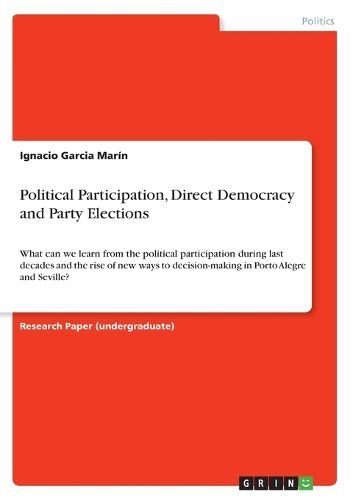Readings Newsletter
Become a Readings Member to make your shopping experience even easier.
Sign in or sign up for free!
You’re not far away from qualifying for FREE standard shipping within Australia
You’ve qualified for FREE standard shipping within Australia
The cart is loading…






Research Paper (undergraduate) from the year 2011 in the subject Politics - International Politics - Region: Middle- and South America, grade: 1,7, Humboldt-University of Berlin, course: 2010-2011, language: English, abstract: In this paper I am going to describe the fall of conventional political participation within western European countries. Later on I am going to defend some possible ways to fix it and finally, I will expose my proposal: promotion of direct democracy through the Participatory Budgeting. With the cases of Porto Alegre and Seville, -with different situations and challenges- the values of transparency, participation, deliberation and responsiveness become especially protagonist. Politicians often think that people do not have any interest for the political arena. In fact, rarely they make decisions to try to attract citizens to institutions. Like the current Prime Minister of the United Kingdom, David Cameron, they blame external factors to explain why citizenship refuses in part their representatives 1. The separation between citizen’s demands and politician’s rules could be a possible answer to the tragic riots during last weeks in England. Similarly, the reason for the Spanish Revolution that pushed during May and June millions of citizens of varied social groups into the streets is not only the tremendous unemployment rate. We cannot understand any social behavior if we exclude the political variable. Both David Cameron as Zapatero have decided strong economic cuts - hard to understand for citizens - while the voice of millions of Europeans against these decisions were expressed roundly. The sensation of politicians deaf respect citizens and the increasing idea that they do not solve anything is frequent. At the same time, social movements, demonstrations and claims thrive, creating a democracy with varied and multiple channels where ideas are expressed. Citizens are interested in politics, but the current representative system is marked by
$9.00 standard shipping within Australia
FREE standard shipping within Australia for orders over $100.00
Express & International shipping calculated at checkout
Research Paper (undergraduate) from the year 2011 in the subject Politics - International Politics - Region: Middle- and South America, grade: 1,7, Humboldt-University of Berlin, course: 2010-2011, language: English, abstract: In this paper I am going to describe the fall of conventional political participation within western European countries. Later on I am going to defend some possible ways to fix it and finally, I will expose my proposal: promotion of direct democracy through the Participatory Budgeting. With the cases of Porto Alegre and Seville, -with different situations and challenges- the values of transparency, participation, deliberation and responsiveness become especially protagonist. Politicians often think that people do not have any interest for the political arena. In fact, rarely they make decisions to try to attract citizens to institutions. Like the current Prime Minister of the United Kingdom, David Cameron, they blame external factors to explain why citizenship refuses in part their representatives 1. The separation between citizen’s demands and politician’s rules could be a possible answer to the tragic riots during last weeks in England. Similarly, the reason for the Spanish Revolution that pushed during May and June millions of citizens of varied social groups into the streets is not only the tremendous unemployment rate. We cannot understand any social behavior if we exclude the political variable. Both David Cameron as Zapatero have decided strong economic cuts - hard to understand for citizens - while the voice of millions of Europeans against these decisions were expressed roundly. The sensation of politicians deaf respect citizens and the increasing idea that they do not solve anything is frequent. At the same time, social movements, demonstrations and claims thrive, creating a democracy with varied and multiple channels where ideas are expressed. Citizens are interested in politics, but the current representative system is marked by